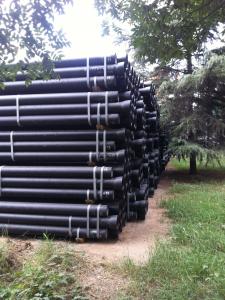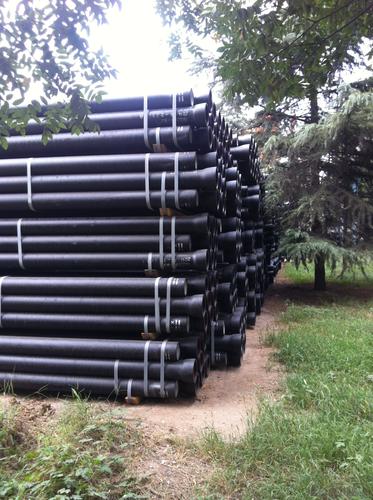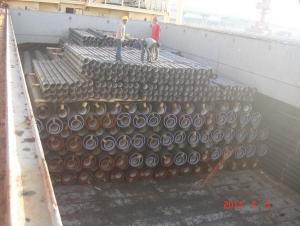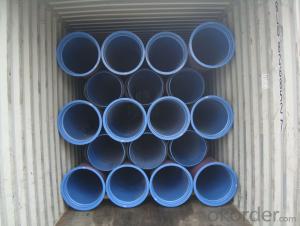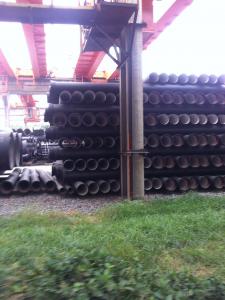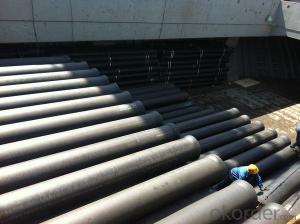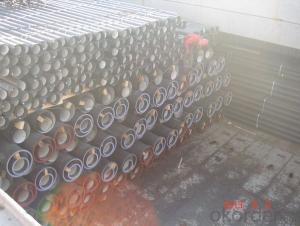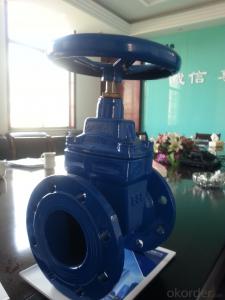DUCTILE IRON PIPE AND PIPE FITTINGS K8 CLASS DN100
- Loading Port:
- Tianjin
- Payment Terms:
- TT OR LC
- Min Order Qty:
- 23 pc
- Supply Capability:
- 3000 pc/month
OKorder Service Pledge
OKorder Financial Service
You Might Also Like
Material : Ductile Cast Iron
Size Range : DN 80mm to DN 2000mm
Unit Effective Length : 6m or 5.7m
Manufacture Standard: ISO 2531:1998/ EN 545:2006/EN 598:2007
Annual capacity : 200,000 tons
Coating Exterior: Zinc 130g/m2 according to ISO 8179-1 and bitumen coating 70 microns.
Cement Interior: Portland Cement/ High Alumina Cement/ Sulphate Resisting Cement Lining according to ISO 4179
Special requirements on external coating and internal lining can be applied
We also provide accessories such as SBR/EPDM rubber gaskets, lubricant paste, pipe caps, PE sleeves, etc.
Additional Parts:
Each pipe is strictly inspected according to related standard to ensure permanently high performance.
Easy Installation at site and service free for life
Long Service Lifespan
Quotation will arrive you within 24hours once we get your inquiry.
We guarantee offering you a competitive price.
A copy of original inspection reports of pipes will be offered after shipment.
Photos of loading process will be sent to the customer after shipment effect.
We will follow-up the delivery progress after shipment effect and update to the customer on weekly basis.
- Q: What are the different methods for joining ductile iron pipe?
- There exists a variety of methods to join ductile iron pipe, each possessing its own advantages and limitations. One commonly utilized technique is the mechanical joint (MJ) coupling, where a rubber gasket, bolts, and nuts are employed to establish a watertight seal between pipe sections. This method is comparatively swift and straightforward to install, although it necessitates the expertise of a skilled technician to ensure proper alignment and bolt tightening to prevent leakage. Another approach is the flanged joint, which involves equipping the pipe ends with flanges that are fastened together using gaskets to form a secure seal. This method permits easy disassembly and reassembly of pipe sections, making it suitable for applications requiring frequent maintenance or alterations. However, it is more costly and time-consuming when compared to other methods. A widely employed method is the push-on joint (POJ), wherein a rubber gasket and a special lubricant are utilized to slide the pipe ends together. This technique yields a reliable and watertight seal, and installation is relatively rapid and simple. However, it necessitates proper alignment and cautiousness to prevent damage to the gasket during assembly. An alternative option is the restrained joint (RJ), which utilizes a mechanical joint coupling with additional features to resist axial forces or thrusts. This method is commonly employed in applications where the pipe is subjected to internal pressure, external loads, or seismic activity. It offers a secure and rigid connection but may require specialized tools and training for installation. Lastly, welding is another method for joining ductile iron pipe. This involves heating the pipe ends and melting a filler metal to create a permanent bond. Welding provides a strong and durable connection, but it demands skilled welders and additional time for preparation, welding, and cooling. It is often employed for specific applications, such as joining sections of pipe with different diameters or connecting to other materials. In conclusion, the various methods for joining ductile iron pipe encompass mechanical joint coupling, flanged joint, push-on joint, restrained joint, and welding. The selection of the method relies on factors such as application requirements, installation time, maintenance needs, and budget.
- Q: Are ductile iron pipes suitable for use in chemical storage tanks?
- Chemical storage tanks cannot be made with ductile iron pipes since they are not able to resist corrosion caused by different chemicals. While ductile iron pipes possess exceptional mechanical properties, such as high tensile strength and impact resistance, they are not equipped to handle the corrosive nature of chemicals. To ensure the safety and integrity of the tank, materials that can withstand the corrosive properties of the stored chemicals, such as fiberglass-reinforced plastic (FRP), stainless steel, or high-density polyethylene (HDPE), are commonly used for chemical storage tanks. It is of utmost importance to carefully choose the appropriate material for chemical storage tanks in order to prevent leaks, contamination, and potential hazards.
- Q: How are ductile iron pipes protected against internal corrosion?
- Ductile iron pipes are protected against internal corrosion through a process called cement mortar lining. This involves applying a layer of cement mortar to the inner surface of the pipe, creating a protective barrier between the iron and the water flowing through it. This lining helps to prevent the formation of rust, corrosion, and scale build-up, ensuring the longevity and durability of the pipes.
- Q: Are ductile iron pipes suitable for use in power plants?
- Yes, ductile iron pipes are suitable for use in power plants. They possess excellent mechanical properties, such as high strength, durability, and impact resistance, making them suitable for transporting water, steam, and various chemicals in power plant applications. Additionally, their corrosion resistance and ability to withstand high temperatures make them a reliable choice for conveying fluids in power generation facilities.
- Q: What effect does magnesium play in nodular cast iron?
- Magnesium is played by spheroidizing.Nodular cast iron is added a certain amount of spheroidizing agent (magnesium or rare earth magnesium alloy) to the paste before casting, so that all or most of the carbon is spherical graphite and is distributed on the base.
- Q: What is the typical lifespan of ductile iron pipe?
- The lifespan of ductile iron pipe can differ based on several factors, including the pipe's quality, the conditions it faces, and the maintenance practices employed. On average, ductile iron pipe typically lasts about 100 years. This longevity is a result of its inherent strength and durability, allowing it to withstand high pressure and various environmental conditions. Furthermore, ductile iron pipe is often coated with protective materials like cement mortar lining or polyethylene encasement, which further enhance its durability. Regular inspections and maintenance can also contribute to extending the lifespan of ductile iron pipe by promptly identifying and addressing any issues or potential damages.
- Q: Can ductile iron pipe be used for wastewater treatment plant sludge dewatering?
- Ductile iron pipe is suitable for the dewatering of sludge in wastewater treatment plants. Its durability, strength, and resistance to corrosion make it a popular choice in these facilities. The pipes can withstand the harsh conditions and abrasive characteristics of the sludge dewatering process. Moreover, their leak-proof joints are essential in preventing any sludge leakage during dewatering. Furthermore, ductile iron pipes come in different sizes and are easy to install, making them a convenient option for wastewater treatment plant sludge dewatering.
- Q: Can ductile iron pipes be used for bridge crossings?
- Yes, ductile iron pipes can be used for bridge crossings. Ductile iron is a strong and durable material that is commonly used in various applications, including water and wastewater systems. When it comes to bridge crossings, ductile iron pipes offer several advantages. They have high tensile strength, which allows them to handle the load and stress imposed by the bridge structure. Additionally, ductile iron pipes are resistant to corrosion, making them suitable for environments where bridges may be exposed to moisture and other harsh conditions. Furthermore, ductile iron pipes have the ability to withstand seismic activity, making them a reliable choice for areas prone to earthquakes. Overall, ductile iron pipes are a suitable and reliable option for bridge crossings due to their strength, durability, corrosion resistance, and ability to withstand seismic activity.
- Q: Can ductile iron pipes be used in areas with high levels of groundwater contamination?
- Ductile iron pipes can be used in areas with high levels of groundwater contamination. Ductile iron is a strong and durable material that is resistant to corrosion, making it suitable for various environments, including those with contaminated groundwater. It offers a high level of resistance to chemicals and can withstand the corrosive effects of contaminants that may be present in the groundwater. Additionally, ductile iron pipes have a protective lining which further enhances their resistance to corrosion. However, it is important to note that the suitability of ductile iron pipes in such areas also depends on the specific nature and concentration of contaminants present in the groundwater. Consultation with experts and adherence to local regulations and industry standards is crucial to ensure the appropriate selection and installation of pipes for areas with high levels of groundwater contamination.
- Q: Can ductile iron pipes be used for pressure surge applications?
- Yes, ductile iron pipes can be used for pressure surge applications. Ductile iron pipes have excellent strength and durability, making them suitable for handling surge pressures caused by sudden changes in flow rates or water hammer events. They can withstand high internal pressures and have a high resistance to impact and fatigue. Additionally, ductile iron pipes have a smooth interior surface that allows for efficient flow of fluids, minimizing the potential for pressure surges. However, it is important to consider factors such as pipe size, wall thickness, and proper installation techniques to ensure the pipes can safely handle the specific pressure surge conditions in a given application. Consulting with a professional engineer or pipe manufacturer is recommended to determine the suitability of ductile iron pipes for pressure surge applications.
Send your message to us
DUCTILE IRON PIPE AND PIPE FITTINGS K8 CLASS DN100
- Loading Port:
- Tianjin
- Payment Terms:
- TT OR LC
- Min Order Qty:
- 23 pc
- Supply Capability:
- 3000 pc/month
OKorder Service Pledge
OKorder Financial Service
Similar products
Hot products
Hot Searches
Related keywords
